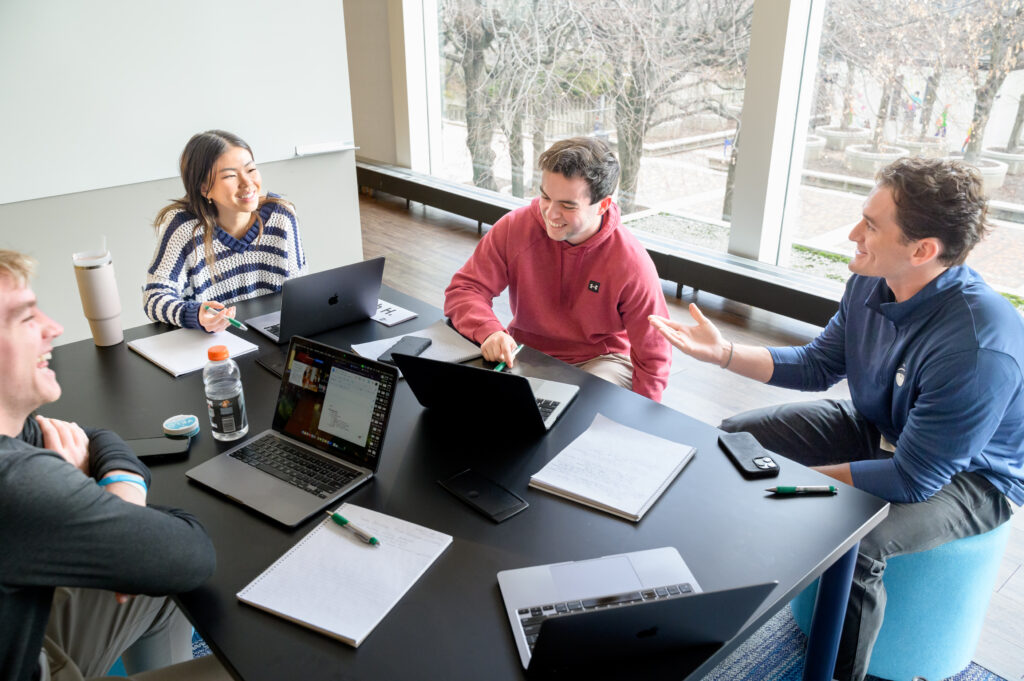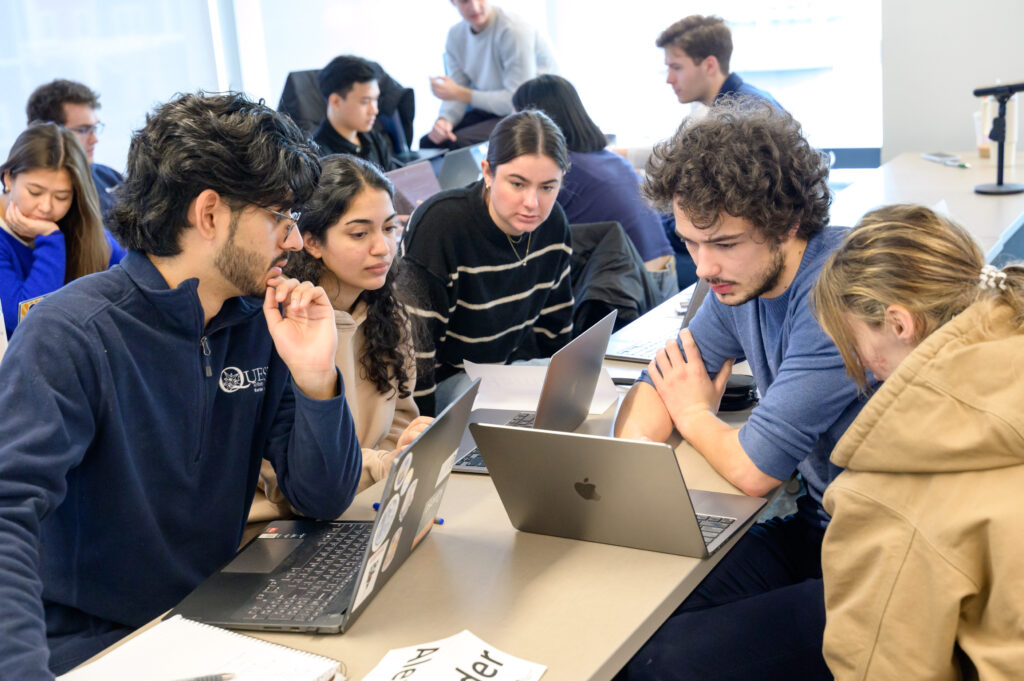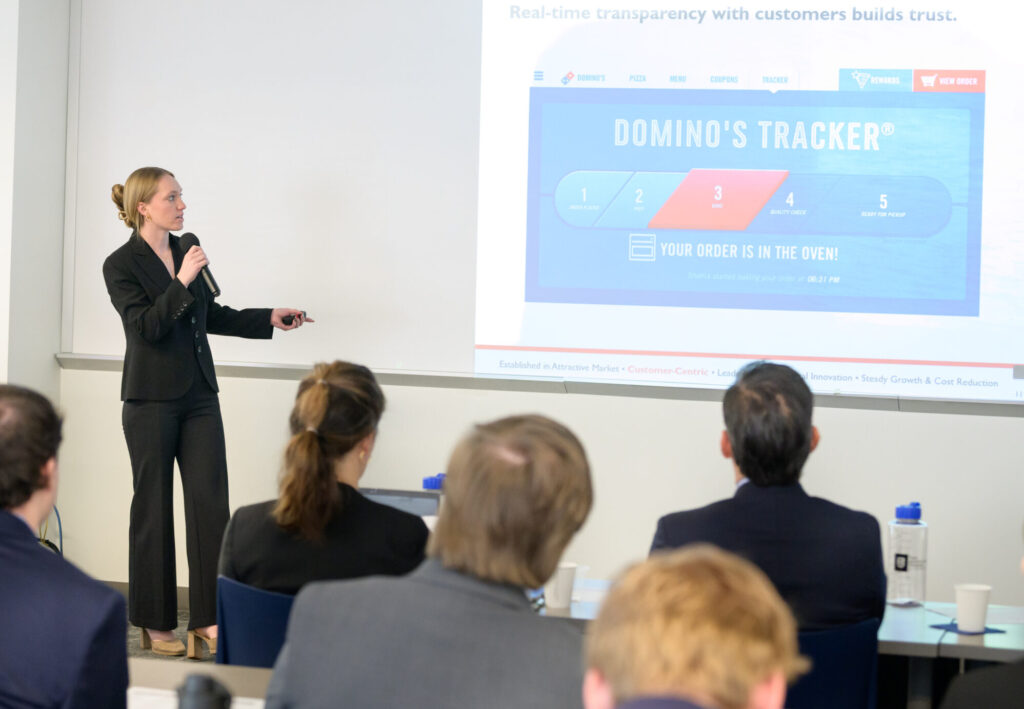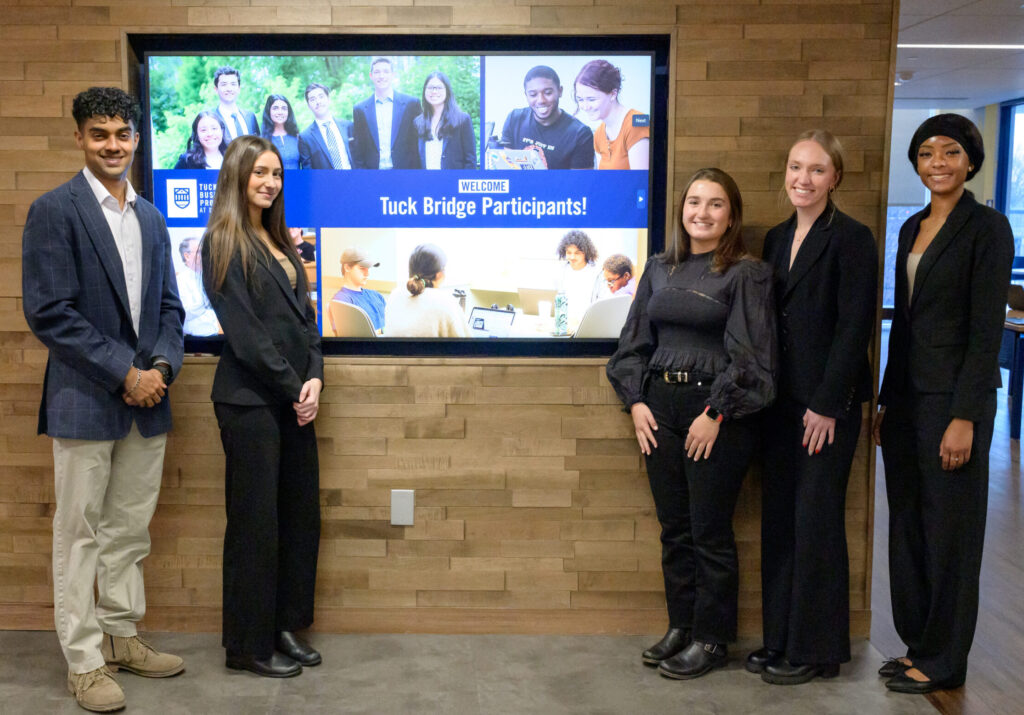Student Q&A: Trinity’s New J-Term Tuck Business Bridge Program
Through a partnership with the Tuck School of Business at Dartmouth, Trinity College offered a new January Term program this year called Tuck Business Bridge. The program focuses on building essential business skills needed to help launch rewarding careers.

At Trinity’s Innovation Hub in downtown Hartford, 37 undergraduate students took part in an intensive classroom experience that included a capstone team project, recruiting services, and one-on-one career guidance. Full or partial scholarships from the Raether Family Charitable Trust enabled all interested students to participate in the program.
With applied sessions in business communications, financial accounting, corporate finance, managerial economics, marketing, and spreadsheet modeling led by Tuck’s MBA faculty, students deepened their leadership, presentation, and collaborative skills to become better decision-makers and communicators.

One Trinity student who enrolled in the intensive three-week program was Lizzie Nelson ’26, a film studies major from Rockville, Maryland, who is also pursuing a minor in writing, rhetoric, and media studies. Nelson holds on-campus jobs with the Office of the President, the Office of Communications and Marketing, and Trinity College Athletics, is a member of the Trinity softball team, sings in the Quirks a cappella group, and hosts a weekly radio show on WRTC.
“The program was intense, but important,” Nelson said. “Tuck Professor Leslie Robinson said that what you put into the program is what you’ll get out of it. I got a good amount out of it because I put a lot of work in.”
Read more from Nelson:
Why did you want to enroll in the Tuck Business Bridge Program?
I have a few family members who went to Dartmouth and did this program, and it got rave reviews. I want to work in sports—maybe a team’s front office—and a lot of places want you to have a business background or sports management degree, so I thought that having some business experience would be helpful for me.
Who did you learn from during this program?
 Our certificate says we took 52 classes during this program, so we had many different professors. Leslie Robinson, our accounting professor, was awesome. She also personally helped my study group with our final project. Our economics professor was Charles Wheelan [clinical professor of business administration at Dartmouth and faculty director of the Center for Business, Government, and Society], the author of the book Naked Economics, which I had read before. Trinity staff at the Innovation Center were so helpful and provided great meals from Hartford restaurants. Although most of the program was virtual, the day before the final presentations we had two people from Tuck [Courtney Pierson, clinical professor of management, and Lisa Tedeschi, executive director of undergraduate programs and select initiatives] come down for a mock presentation, and we made a lot of improvements based on that feedback. For the final presentations, we also had two panelists [guest investors Fernando Maddock, a Tuck alumnus, and Trinity alumna Kate Rausch ’08, who also completed the Tuck Business Bridge Program] in person at the Innovation Hub.
Our certificate says we took 52 classes during this program, so we had many different professors. Leslie Robinson, our accounting professor, was awesome. She also personally helped my study group with our final project. Our economics professor was Charles Wheelan [clinical professor of business administration at Dartmouth and faculty director of the Center for Business, Government, and Society], the author of the book Naked Economics, which I had read before. Trinity staff at the Innovation Center were so helpful and provided great meals from Hartford restaurants. Although most of the program was virtual, the day before the final presentations we had two people from Tuck [Courtney Pierson, clinical professor of management, and Lisa Tedeschi, executive director of undergraduate programs and select initiatives] come down for a mock presentation, and we made a lot of improvements based on that feedback. For the final presentations, we also had two panelists [guest investors Fernando Maddock, a Tuck alumnus, and Trinity alumna Kate Rausch ’08, who also completed the Tuck Business Bridge Program] in person at the Innovation Hub.
How was this different from your other Trinity courses?
 It was almost 70 hours of in-class instruction time over three weeks, not including time we spent with our study groups working on our capstone projects outside of class. We also consulted with an MBA at Dartmouth on our capstone. It was a ton of work in a condensed period of time. During a normal semester, you have four classes, plus extracurriculars, but this was a dedicated environment where all you had to focus on was this program. I would wake up, go to class all day, do the homework, and go to bed. It was a grind, but it was the only thing on your mind.
It was almost 70 hours of in-class instruction time over three weeks, not including time we spent with our study groups working on our capstone projects outside of class. We also consulted with an MBA at Dartmouth on our capstone. It was a ton of work in a condensed period of time. During a normal semester, you have four classes, plus extracurriculars, but this was a dedicated environment where all you had to focus on was this program. I would wake up, go to class all day, do the homework, and go to bed. It was a grind, but it was the only thing on your mind.
What were some of the most memorable lessons?
I was very nervous going in—as a film studies major—that this would be a program only taken by economics majors. But Professor Wheelan really explained the material on a level that was understandable for people who didn’t have any background there by giving examples of supply and demand, like Uber surge pricing. There was a team-building exercise that was a simulation of a summit of Mt. Everest, where everyone had to collaborate. And a marketing lesson talked about the things that Major League Baseball did recently to attract audiences and make the game faster, like making the size of the bases bigger and introducing a pitch clock. I really related to that one.
What was your final project?

The capstone presentations were PowerPoints created by study groups. Each of the seven groups chose a publicly traded company to do an evaluation of, and my group chose Domino’s Pizza. We looked at how the market values it and concluded that the market currently undervalues Domino’s. They do a lot of work with AI and have a partnership with Microsoft for their pizza tracker and for optimizing delivery routes. I focused on the customer feedback aspects and the things the company has done to improve satisfaction.
What will you take away from this experience that you think may benefit your career?

I’m definitely leaving with new friendships; I didn’t know anybody in the program going in. Professionally, I got to know how to navigate an extended workday, which is necessary for the field I’m interested in. We had to stay focused for long periods of time and work toward a common goal by prioritizing different things. It was great to collaborate with groupmates on the subjects I was not as strong in. I re-vamped my whole résumé during this program, and met with several people to talk about it and revise it. I think networking is also important; I’m reaching out to another Tuck Bridge alum who works in Major League Baseball. A lot of people know about Tuck Bridge and it’s a valuable experience to have. I think knowing some basics of the business world will be very helpful.
For more details or questions about the Trinity Tuck Business Bridge Program, email [email protected]. Learn more about Tuck Business Bridge here.
